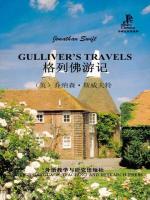人性与社会的“镜像”
用户732470
For the first time, I have completely read "Gulliver's
Travels." My previous impressions were always stuck on the adorable
and amusing stories of Lilliput seen in an animated film during a
Children's Day celebration in elementary school, where the author was
known as Tai Shan. There, the king of Lilliput conversed with him in his
palm and he undertook the heroic feat of dragging the entire enemy fleet
with a hook across the sea. Yet, the novel contains many more strange
and wonderful countries and islands: the land of giants, Laputa with its
flying island (a floating island), Balnibarbi (a country subservient to
Laputa), the sorcery island of Glubbdubdrib, Japan island, and the
island of Houyhnhnms (where horses are the most rational rulers). The
vivid and peculiar imagination easily evokes adventures akin to
"The Adventures of Sinbad" from "One Thousand and One
Nights," the satirical novel "Journey to the West" from
China's Qing Dynasty, or the long-running Japanese anime "One
Piece," which perhaps inherits the style of "Gulliver's
Travels" in many ways. The Age of Discovery's quest for gold and
adventure, both wondrous and thrilling, reveals that these bizarre and
ludicrous kingdoms have origins and real-world significance, reflecting
complex human nature. The novel sharply satirizes the greed of the
British government and human nature, senseless warfare and slaughter,
and the pretensions of pseudo-science. Lilliput: A miniature England
where government positions are gained through jumping on a tightrope,
and a long-standing war between the high-heeled and low-heeled factions
revolves around how eggs should be cracked (from the big end or the
small end). Brobdingnag: A gentle giant race that is self-sufficient,
isolated, non-competitive towards others, situated on a peninsula. The
author becomes a child's toy and a means for their master to earn money.
Later, the author enters the palace to please the king and queen.
Conversations with the king of Brobdingnag introduce the government
structure of England: the House of Lords, the House of Commons, courts
and lawyers, finance and economics, and the powerful army and navy over
the last hundred years. The king refutes each and every one, asserts
that a series of historical events in England is just a string of
conspiracies, rebellions, murders, massacres, revolutions, and purges,
with the worst result being greed, factionalism, and so on. The giant
nation is a closed, intellectually stifled state, focused solely on
ethics, history, poetry, and mathematics. The despotic king is
worshipped, but faces internal rebellion from nobles coveting power.
Similar to China's "land of giants," it is enclosed by
mountains, deserts, and seas, a feudal autocratic state surrounded by
small states and barbarians overseas. The country awoke as if in a dream
only when the Opium War broke open its doors. Laputa Journey: A group
of kings and ministers who spend their days pondering only mathematics
and music, indifferent to everything else including wives and children.
They are a tedious aristocracy of silly birds who even need servants to
slap their ears and mouths with bladder urine to remind them to talk.
Daily contemplation is worthless pseudo-science. For the rule of the
city, it relies on the floating island that can be freely controlled,
tormenting residents on the ground to submit, pay taxes, and maintain
their luxurious lifestyle. The Ragado University, a group of visionary
designers who are a waste of money, creates meaningless
pseudo-scientific inventions: extracting sunlight from cucumbers,
burning ice into gunpowder, reducing excrement to food, using pigs to
cultivate land, judging loyalty by the color of excrement (similar to
using "how's your stool?" to inquire about illness), and other
oddities. The school teaches students, propositions, and algorithms
using inks made from the medicine used to treat head ailments written on
thin pastries. Students eat pastries, and the medicine runs into their
brains, which is duck-style education. On the magic island of summoning,
the author saw the most famous ancient sages, scholars, and historical
legends, subverted traditional history, and the so-called historical
heroes were also the ugliest. People use bribery, assassination,
forgery, and other despicable means to seize high positions. Ragadangan,
the pain of immortals, brought to them by the terrifying prospect of
never dying, is as stubborn, stubborn, greedy, solitary, arrogant, and
talkative as they are devoid of human and love. Houyhnhnms Island: The
horse is the supreme ruler of this country, a model of rationality and
morality, which contrasts with the barbarism and ugliness of Yehu (the
lower creatures, similar to humans). By describing Yehu, the author
criticized the greed and selfishness of human nature. Although Huiyin is
noble and selfless like a saint, his life is quite boring, a country
without words, and self-proclaimed moral gentlemen, but there is no
difference between masters and servants.



 京公网安备 11010802032529号
京公网安备 11010802032529号